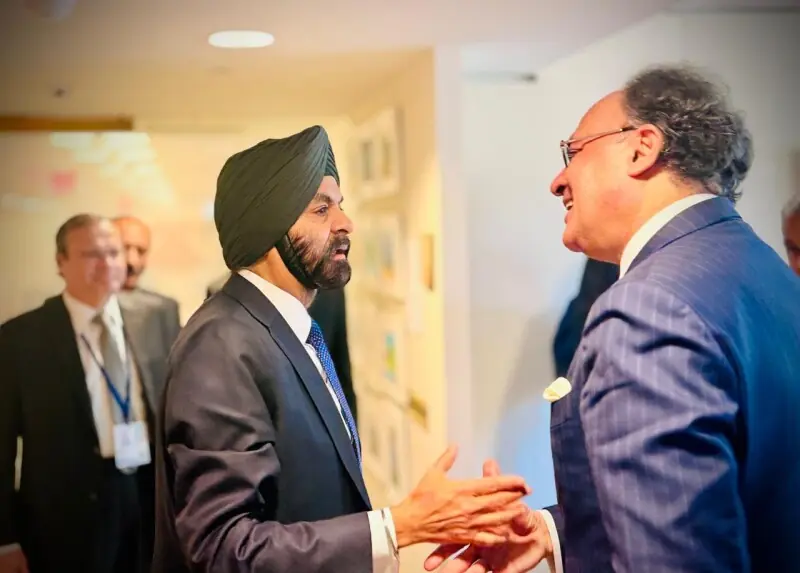Finance Minister Muhammad Aurangzeb met with World Bank President Ajay Banga in Washington DC, where he discussed Pakistan’s post-flood recovery efforts, ongoing economic reforms, and future development priorities.
Aurangzeb continued his important engagements on the fifth day of his visit to Washington D.C., where he is attending the Annual Meetings of the International Monetary Fund (IMF) and the World Bank Group, read a statement released by the Finance Division.
During his key engagement with Ajay Banga, the finance minister recalled the prime minister’s productive engagement with him during the UN General Assembly session.
He briefed the World Bank chief on the government’s flood response and appreciated the multilateral lender’s support following the completion of the post-flood damage assessment.
Aurangzeb endorsed the proposal of utilising technology platforms and cooperatives to reach small farmers and thanked the World Bank for its technical assistance in developing Pakistan’s Tariff Policy.
He also apprised the World Bank president of the Memoranda of Understanding signed with provinces for the implementation of the Country Partnership Framework (CPF) and requested additional support under the IDA window in view of reduced allocations. Both sides also discussed adopting a holistic approach to reforms in the gas and power sectors.
Pakistan deepens global partnerships as Japan’s JBIC joins Reko Diq lender group
Later, Aurangzeb participated in a high-level event titled “Financing in a Fragmented World”, where he outlined the global growth headwinds anticipated for 2025–26, including rising trade barriers and falling energy prices.
In his remarks, he noted that the global economy had proven more resilient than projected earlier in 2025, despite reciprocal tariffs imposed in recent months.
He viewed Pakistan’s ongoing trade negotiations with US authorities, engagement with Chinese leadership, new security arrangement with Saudi Arabia, and the launch of CPEC 2.0 as key geopolitical developments positively influencing Pakistan’s economic outlook.
The finance minister emphasised that global trade fragmentation was prompting countries to strengthen regional corridors and diversify trading partners.
Aurangzeb also met with officials from Fitch Ratings, thanking the global rating agency for upgrading Pakistan’s credit rating to B- with a stable outlook, and expressed satisfaction that all three major agencies were now aligned in their assessments.
He briefed the Fitch team on the recent International Monetary Fund (IMF) staff-level agreement (SLA), ongoing trade and tariff negotiations with the US administration, and reforms in taxation, energy, privatization, and state-owned enterprises (SOEs).
He highlighted the government’s continued efforts toward privatisation and diversification of financing through Panda Bonds.
The finance minister expressed optimism regarding further improvement in Pakistan’s ratings going forward and responded to queries from the Fitch team.
In his meeting with Dr Adnan Chilwan, Group CEO of Dubai Islamic Bank (DIB), the finance minister appreciated DIB’s role as a leading global arranger of sovereign Sukuk for Pakistan. He noted the government’s progress on privatisation initiatives, including that of the First Women Bank, and reaffirmed Pakistan’s focus on diversifying its funding mix across USD, Panda, and Sukuk markets.
The finance minister also held meetings with the management of Sharjah Islamic Bank and Ajman Bank, thanking them for their participation in syndicated transactions. He briefed the banks on Pakistan’s plan to issue its inaugural Panda Bond in the Chinese market as part of its financing diversification strategy and encouraged further engagement with the Debt Management Office for future collaboration opportunities.


